Panda Restaurant Group Bundle
Who Really Owns Panda Express?
Understanding a company's ownership is crucial for investors and business strategists alike. The story of Panda Restaurant Group, the parent company behind the wildly successful Panda Express, is a fascinating tale of family, vision, and culinary innovation. Discover the key players and the evolution of control that have shaped this fast-casual giant and its impressive growth.
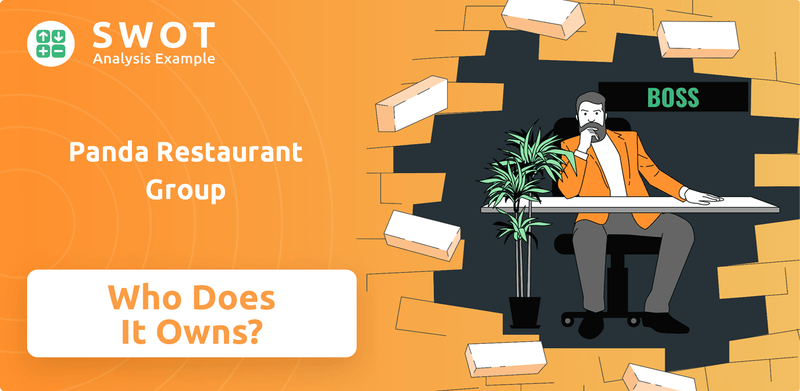
From its humble beginnings in 1973, Panda Express has become a dominant force in the fast-casual dining industry, with over 2,500 locations worldwide as of late 2024. The company's impressive $6.2 billion in U.S. sales in 2024 and an estimated net worth of $9 billion by June 2025 highlight its financial prowess. To gain a deeper understanding of the Panda Restaurant Group SWOT Analysis, explore the ownership structure and its impact on the company's strategic direction and sustained success. This exploration will delve into the Panda Express parent company and its leadership.
Who Founded Panda Restaurant Group?
The Panda Restaurant Group, known for its popular chain Panda Express, was established in 1973. The original concept, Panda Inn, was the brainchild of Andrew Cherng and his father, Master Chef Ming-Tsai Cherng.
Andrew Cherng, who immigrated from China, used his education in mathematics to lay the groundwork for the business. The first restaurant was funded by family resources and a loan from the Small Business Administration.
Peggy Cherng, Andrew's wife, joined the company in 1982. She brought her expertise in electrical engineering and computer science to the table, which helped in the company's expansion. The Cherngs co-founded Panda Express in 1983.
Andrew Cherng and his father, Master Chef Ming-Tsai Cherng, founded Panda Restaurant Group.
The initial funding came from family resources and a loan from the Small Business Administration.
Peggy Cherng's background in engineering supported the company's growth through systems development.
The company grew from five locations to nine by 1985.
A strong family-oriented culture was established early on, emphasizing consistent quality and service.
Andrew and Peggy Cherng remain the key stakeholders of Panda Restaurant Group.
The Panda Express owner and Panda Express parent company are both Panda Restaurant Group. The company's early success is a testament to the founders' vision and their hands-on approach to the business. For more insights into the Marketing Strategy of Panda Restaurant Group, you can check out this article: Marketing Strategy of Panda Restaurant Group. The company's commitment to quality and service has been a constant throughout its history, contributing to its growth from a single restaurant to a large chain. As of 2024, Panda Express has over 2,300 locations worldwide, demonstrating the significant impact of the founders' initial vision.
Here are the key takeaways about the founding and early ownership of Panda Restaurant Group:
- Founded in 1973 by Andrew Cherng and his father.
- Peggy Cherng joined in 1982 and played a key role in expansion.
- Panda Express was launched in 1983.
- The company grew quickly in its early years.
- Andrew and Peggy Cherng remain the primary stakeholders.
Panda Restaurant Group SWOT Analysis
- Complete SWOT Breakdown
- Fully Customizable
- Editable in Excel & Word
- Professional Formatting
- Investor-Ready Format
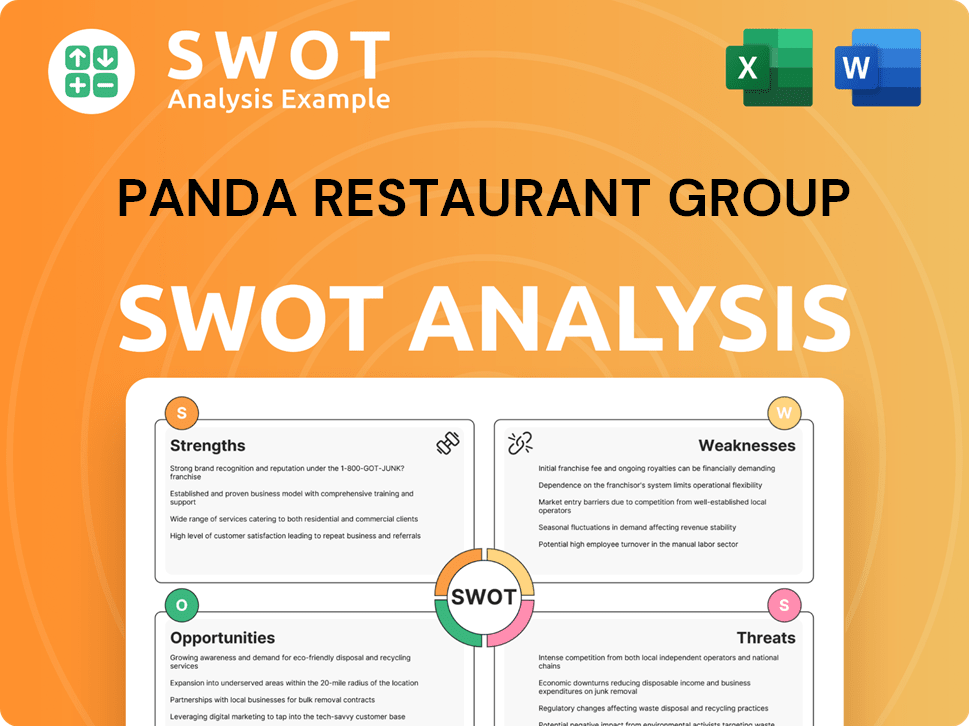
How Has Panda Restaurant Group’s Ownership Changed Over Time?
The ownership of Panda Restaurant Group, the parent company of Panda Express, is deeply rooted in the Cherng family. Since its inception, the company has remained privately held, with Andrew Cherng and Peggy Cherng, the co-founders, maintaining complete control. Their leadership and ownership are channeled through the Cherng Family Trust, ensuring a unified vision and long-term strategic planning. This structure has been consistent throughout the company's history, allowing for focused decision-making and a commitment to both business success and community involvement.
The evolution of Panda Restaurant Group's ownership has been marked by a steadfast commitment to family control. The absence of public shareholders or external investors underscores the Cherng family's dedication to their vision. Their daughter, Andrea Cherng, holding the position of Chief Brand Officer, signifies the continuation of family leadership into the next generation. This approach enables the company to prioritize its values and long-term goals, as demonstrated by initiatives like Panda Cares and the company's expansive global presence.
| Aspect | Details | Year |
|---|---|---|
| Ownership Structure | Privately held, controlled by the Cherng Family Trust | 2025 |
| Founders | Andrew Cherng and Peggy Cherng | - |
| Estimated Net Worth of Cherng Family | Approximately $3.1 billion | 2025 |
The financial success of Panda Restaurant Group is evident in its impressive scale and revenue. With over 2,500 locations globally, the company has established a significant market presence. In 2024, Panda Restaurant Group reported approximately $6.2 billion in U.S. sales, highlighting its strong financial performance. This financial strength supports the company's ability to invest in its operations, expand its reach, and continue its philanthropic efforts. To learn more about their business model, you can read about the Revenue Streams & Business Model of Panda Restaurant Group.
Panda Restaurant Group is privately owned by the Cherng family, with Andrew and Peggy Cherng as co-founders. The company operates through the Cherng Family Trust. The family's net worth is approximately $3.1 billion as of 2025.
- Panda Express owner: Cherng Family
- Panda Express parent company: Panda Restaurant Group
- Who owns Panda Express: The Cherng Family Trust
- Panda Express leadership: Andrew and Peggy Cherng, Andrea Cherng
Panda Restaurant Group PESTLE Analysis
- Covers All 6 PESTLE Categories
- No Research Needed – Save Hours of Work
- Built by Experts, Trusted by Consultants
- Instant Download, Ready to Use
- 100% Editable, Fully Customizable
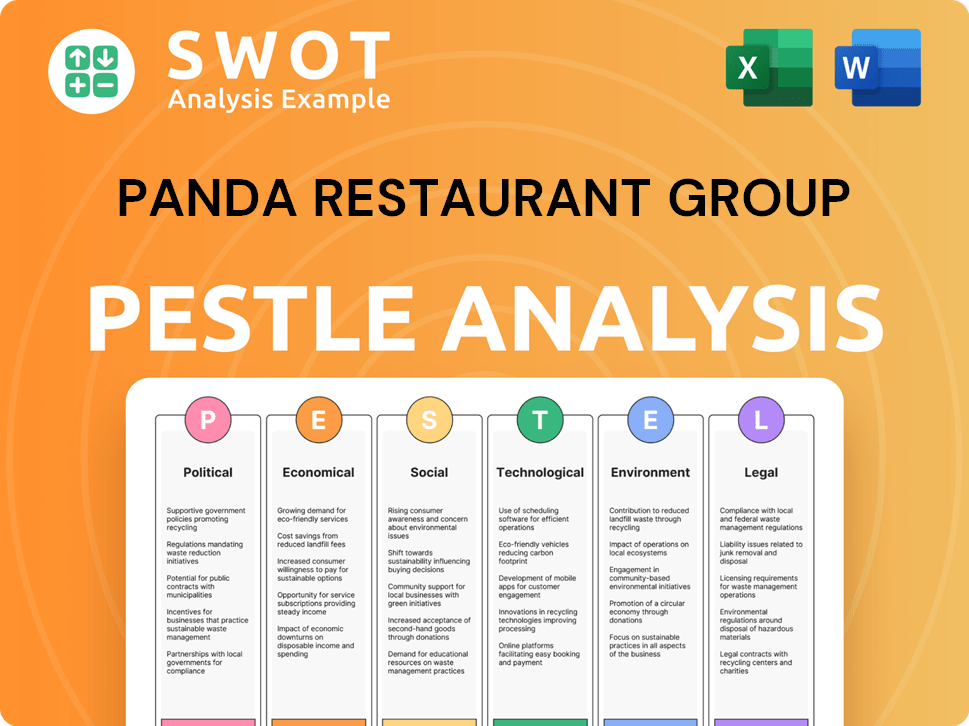
Who Sits on Panda Restaurant Group’s Board?
As a privately held entity, the specifics of the Panda Restaurant Group's board of directors and voting structure are not publicly disclosed in the same manner as publicly traded companies. The leadership team predominantly comprises family members and key executives. The co-founders, Andrew and Peggy Cherng, hold the positions of Co-Chairs and Co-CEOs, wielding substantial personal equity and decision-making authority. Their daughter, Andrea Cherng, serves as the Chief Brand Officer, reinforcing the family's presence in the leadership.
Other key figures in the leadership team include James Ku as Chief Development Officer, David Landsberg as Chief Financial Officer, and Monte Baier as Senior Vice President and General Counsel. While specific voting rights or the existence of dual-class shares are not publicly detailed, the concentrated family ownership through the Cherng Family Trust suggests that the Cherng family maintains significant control over strategic decisions. In 2025, Billy To from Panda Restaurant Group, Inc. was elected to the Restaurant Facility Management Association (RFMA) Board, indicating professional engagement within the broader industry.
| Leadership Role | Name | Title |
|---|---|---|
| Co-Founder, Co-Chair, Co-CEO | Andrew Cherng | |
| Co-Founder, Co-Chair, Co-CEO | Peggy Cherng | |
| Chief Brand Officer | Andrea Cherng | |
| Chief Development Officer | James Ku | |
| Chief Financial Officer | David Landsberg | |
| Senior Vice President and General Counsel | Monte Baier |
The Panda Restaurant Group's structure, with the Cherng family at the helm, allows for streamlined decision-making. This structure is a key element of the Panda Express parent company's operational strategy, enabling rapid responses to market changes and maintaining a consistent brand identity across its numerous locations. Understanding the Panda Express leadership is crucial for grasping the company's strategic direction and its ability to adapt within the competitive restaurant industry. The company's focus on family leadership and strategic planning has been instrumental in its success, as detailed in the history of Panda Express.
The Panda Restaurant Group is primarily controlled by the founding Cherng family, with Andrew and Peggy Cherng as Co-Chairs and Co-CEOs. This structure gives the family significant decision-making power and influence over the company's direction.
- Family-led leadership ensures a unified vision and strategic alignment.
- Key executives like James Ku and David Landsberg support operational efficiency.
- The company's structure allows for quick decision-making and adaptability.
- The Cherng family's involvement is critical to the Panda Express's long-term strategy and values.
Panda Restaurant Group Business Model Canvas
- Complete 9-Block Business Model Canvas
- Effortlessly Communicate Your Business Strategy
- Investor-Ready BMC Format
- 100% Editable and Customizable
- Clear and Structured Layout
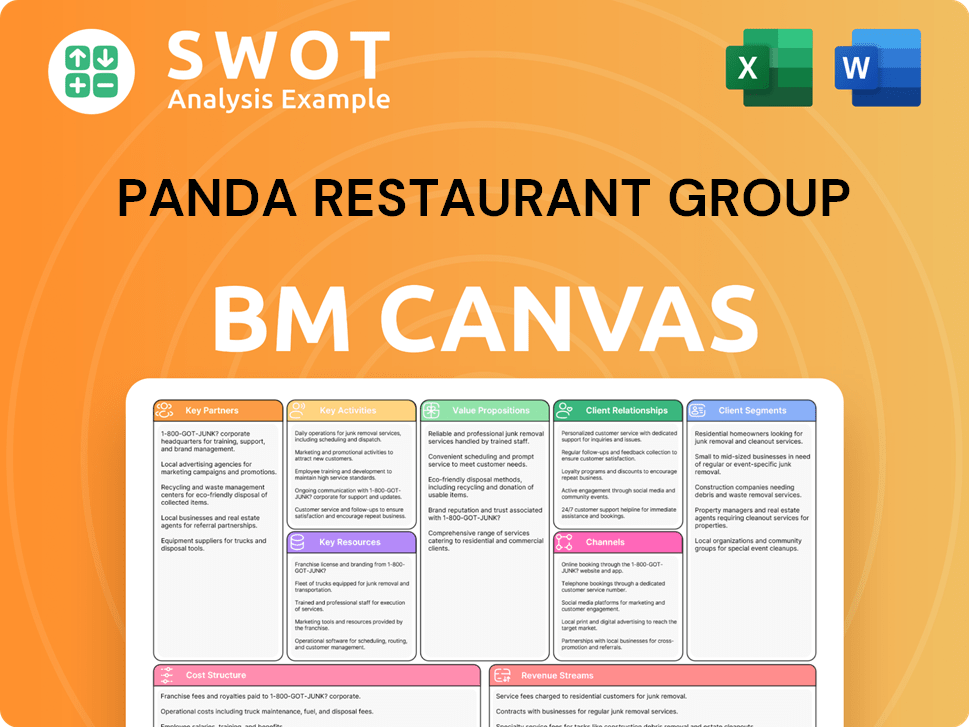
What Recent Changes Have Shaped Panda Restaurant Group’s Ownership Landscape?
In the past few years, the Panda Restaurant Group has maintained its privately-held status while continuing its expansion. As of December 28, 2024, Panda Express operated 2,502 restaurants. The company's growth is largely driven by corporate development, with 2,248 corporate restaurants and 173 licensed locations as of late 2024. The group has also extended its global footprint, with 97 international franchised restaurants as of December 28, 2024. This expansion highlights the company's strategic focus on both domestic and international markets, solidifying its position as a major player in the fast-casual dining sector.
Panda Restaurant Group's annual revenue reached $5 billion as of June 2025. In 2024, Panda Express saw systemwide sales reach approximately $4.5 billion and U.S. sales of approximately $6.2 billion. Digital channels accounted for 25% of revenue as of 2024, demonstrating the company's commitment to digital transformation. Recent philanthropic efforts, such as a $17 million donation in February 2025, reflect the family's ongoing commitment to giving back. The Panda Express owner, the Cherng family, has emphasized their dedication to keeping the company privately owned, with no immediate plans for a public listing. For more insights, check out the Brief History of Panda Restaurant Group.
The company has steadily increased its restaurant count, with a net increase of 89 restaurants in 2024, surpassing the growth of previous years. This expansion demonstrates the company's successful strategies and market demand. The company also continues to grow its international presence.
Digital channels are a significant part of revenue, accounting for 25% as of 2024. This shows a focus on adapting to changing consumer behaviors. The company is investing in technology to enhance the customer experience.
The company remains privately owned, with the Cherng family committed to maintaining its private status. This stability allows for long-term strategic planning. There are no indications of changes in ownership structure.
Panda Restaurant Group is well-positioned to capitalize on industry trends, including demand for quick and high-quality dining. The company's focus on healthier options and digital solutions supports its growth. It is well-positioned for sustained growth.
Panda Restaurant Group Porter's Five Forces Analysis
- Covers All 5 Competitive Forces in Detail
- Structured for Consultants, Students, and Founders
- 100% Editable in Microsoft Word & Excel
- Instant Digital Download – Use Immediately
- Compatible with Mac & PC – Fully Unlocked
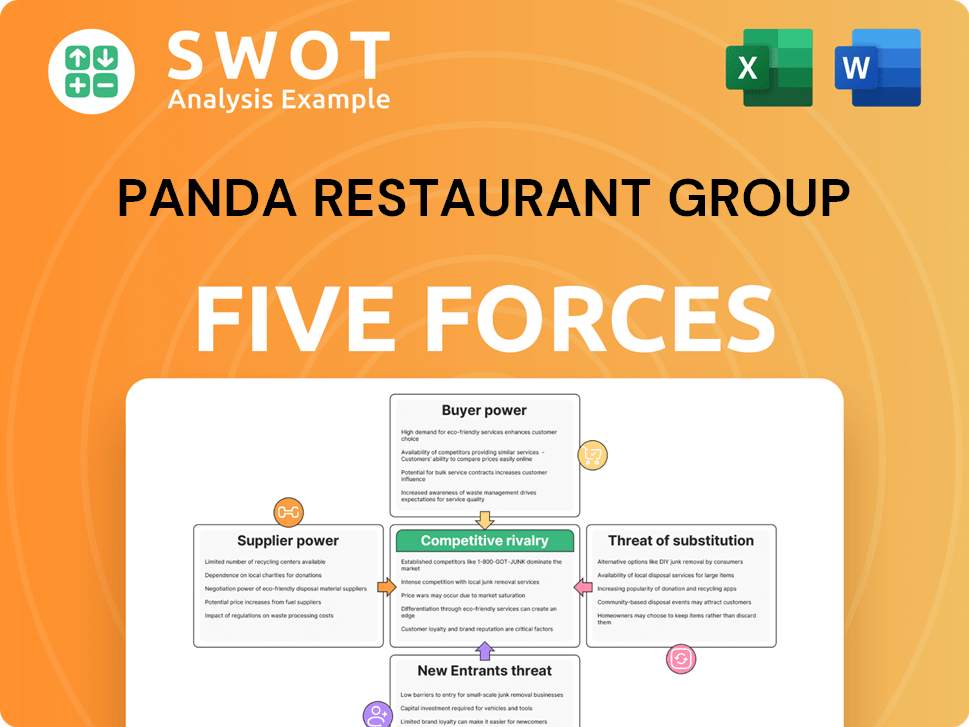
Related Blogs
- What are Mission Vision & Core Values of Panda Restaurant Group Company?
- What is Competitive Landscape of Panda Restaurant Group Company?
- What is Growth Strategy and Future Prospects of Panda Restaurant Group Company?
- How Does Panda Restaurant Group Company Work?
- What is Sales and Marketing Strategy of Panda Restaurant Group Company?
- What is Brief History of Panda Restaurant Group Company?
- What is Customer Demographics and Target Market of Panda Restaurant Group Company?
Disclaimer
All information, articles, and product details provided on this website are for general informational and educational purposes only. We do not claim any ownership over, nor do we intend to infringe upon, any trademarks, copyrights, logos, brand names, or other intellectual property mentioned or depicted on this site. Such intellectual property remains the property of its respective owners, and any references here are made solely for identification or informational purposes, without implying any affiliation, endorsement, or partnership.
We make no representations or warranties, express or implied, regarding the accuracy, completeness, or suitability of any content or products presented. Nothing on this website should be construed as legal, tax, investment, financial, medical, or other professional advice. In addition, no part of this site—including articles or product references—constitutes a solicitation, recommendation, endorsement, advertisement, or offer to buy or sell any securities, franchises, or other financial instruments, particularly in jurisdictions where such activity would be unlawful.
All content is of a general nature and may not address the specific circumstances of any individual or entity. It is not a substitute for professional advice or services. Any actions you take based on the information provided here are strictly at your own risk. You accept full responsibility for any decisions or outcomes arising from your use of this website and agree to release us from any liability in connection with your use of, or reliance upon, the content or products found herein.